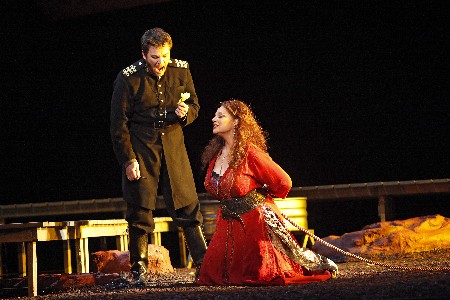Opera Review: ‘Carmen’
By Caldwell Titcomb

Carmen (mezzo-soprano Dana Beth Miller) swears she will love Don José (tenor John Bellemer) if he releases her from prison. Jeffrey Dunn/BLO.
The Boston Lyric Opera (BLO) is currently offering Georges Bizet’s “Carmen,” his last completed and finest opera, which had its delayed and unsuccessful premiere in 1875. According to Opera America, “Carmen” ranks No. 4 in the list of most performed works from the 1880s to 2005, surpassed only by Puccini’s “Madama Butterfly” and “La Bohème” and Verdi’s “La Traviata.” At New York’s Metropolitan Opera, which started in 1880, “Carmen” now ranks third, after “La Bohème” and Verdi’s “Aïda.”
The BLO presented the work in the 1993-94 season and again in the 2002-03 season. Its third mounting, while not perfect, is mighty impressive. Based on Mérimée’s 1845 novella, the libretto – by Henri Leilhac and Ludovic Halévy – is one of the best in the repertory, and Bizet himself had a substantial hand in fashioning it.
It contains much spoken dialogue between the musical numbers, and that is how it ought to be presented. Bizet died at 37 only three months after the Paris premiere, and his friend Ernest Guiraud turned the dialogue into sung recitatives for the ensuing Vienna production – a practice still widely followed. Wisely, the BLO decided to preserve the spoken dialogue, which affords better pacing. Not so wisely, some of the music has been curtailed, although Bizet did make a few cuts himself.
The plot of the opera is quite different from that of the source novella – and an improvement. The bullfighter Escamillo and Micaëla are not in the original, and the behavioral changes in Don José are new. The prescribed four disparate settings (which necessitated three 30-minute intermissions in the premiere production) are largely avoided, with set designer John Conklin providing instead a huge suspended rectangular mosaic panel that shifts position.
The title role is in the hands of mezzo-soprano Dana Beth Miller, who first appears in a flaming red dress. Carmen is not the traditional heroine, but is in fact amoral and hot-headed, picking up and dropping lovers as her whims dictate. Miller has a rich voice, particularly strong in her lower range around middle C, though her French diction is often unclear.
Her sometime lover Don José is the character we most care about. He starts as a simple loyal soldier who later rebels against authority, deserts, takes up smuggling and winds up a murderer. A bearded John Bellemer brings a nice lyrical tenor to the part, though a bit more forcefulness in his acting would be welcome.
It is a neat touch that Escamillo on his first appearance displays the bloody wounds of being gored by a bull. Baritone Daniel Mobbs enacts the role admirably, and gets to sing the opera’s most famous number, the Toreador Song. (Bizet wrote it as a sop to the masses, saying, “If they want trash, I’ll give them trash.” It is comparable to “La donna è mobile” in Verdi’s “Rigoletto.”)
Soprano Hanan Alattar does a lovely job with Micaëla’s solo aria in Act 3. There is good support from bass Darren K. Stokes as Captain Zuniga and from sopranos Meredith Hansen and Stephanie Chigas as Carmen’s gypsy sidekicks. The 28 members of the chorus do a particularly vigorous job with their assignments. In the spoken dialogue some of the cast have better French accents than others.
The director of the production is Nicholas Muni, whose staging is generally laudable. In the last scene he has come up with the idea of having Carmen and Escamillo in bed together, the latter then arising and donning his colorful bullfighting attire before going off to face his next animal. This works well enough. But at the end Muni has Don José strangle Carmen to death instead of stabbing her as the libretto specifies. Throughout the opera, mayhem both onstage and offstage is carried out by the blade, and Muni should have stuck to the prescribed action.
The 50-piece orchestra is under the baton of Keith Lockhart, on leave from the Boston Pops. He gets exemplary playing from his charges. It helps of course that Bizet provided sterling orchestration, especially his writing for the woodwinds. The composer Richard Strauss, no mean orchestrator himself, said that anyone who wants to master instrumentation could do no better than study the score of “Carmen.”
Brahms went to hear it twenty times in Vienna. Wagner said, “Here at last for a change is someone with ideas in his head.” Tchaikovsky stated, “‘Carmen’ is a masterpiece in every sense of the word….In ten years [it] will be the most popular opera in the whole world.” Its stature is now unassailable. And a good production, like this one, is always welcome.
The final performance takes place at 7:30 on Tuesday, November 17, at the Shubert Theatre.
Tagged: Boston-Lyric-Opera, Caldwell-Titcomb, Carmen, Dana Beth Miller, Georges Bizet
